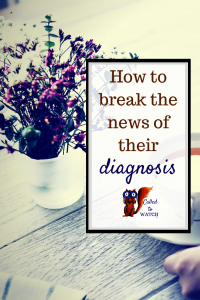It is excruciating.
And the problem is, we all have more than one person in our lives. And so we are forced to tell the same sad story again and again.
This is not a post with a lot of answers. I’m not sure there are answers. But sometimes, empathy is enough. I pray that is the case here. For you. For me.
Breaking the news of a diagnosis is complex (we need to acknowledge this)
Every situation is different – and the truth is, we are going to have share in many situations. We all have best friends, distant friends, close family, family that live far away, colleagues, communities, church families, sport teams, school classes…. The list goes on.
Chances are, sharing with each of them will look different.
The amount of detail we go into. The way in which we share (over the phone, email, face to face, public announcements).
The extent to which we invite them into our lives to experience the diagnosis.
The time after the diagnosis until we break the news for the first time (minutes, days, weeks, years).
Whether we tell them the first time we see them or wait for an appropriate situation (does such a time ever come?).
There is no one way which fits all. No one way to go about things. Oh, this makes it so hard, my friends. So terrifying. So painful.
3 Reasons breaking the news of a diagnosis is hard (besides the obvious)
I think we all agree chronic sickness is awful, and we do not like talking or thinking about awful things. Enough said.
But sharing a diagnosis is also hard, because:
-
Sharing creates reality
Perhaps when the doctors first explained it, the reality of the sickness seemed a bit abstract. Or perhaps we only really focused on one particular part, or decided we would simply try our best to minimize its impact on our Loved One in a certain area.
When we break the news of a diagnosis to another person, it becomes absolutely cemented into reality. Words seem to make things real. Passing on information even more so. They say to learn something thoroughly you must teach it to someone else.
Sadly, the same appears to be true with a diagnosis.
-
Sharing makes us vulnerable
A diagnosis is shattering.
Sharing it forces us to relive the devastation. It breaks us, to share. We become emotional and vulnerable. Perhaps we will cry. Perhaps we will rage. Either way, everyone will see our cracks and our helplessness.
When we share we become acutely aware of how we appear in the eyes of others. I think that is partly because we realise how monumental this moment is. It is not every day you share a diagnosis of chronic illness. And so not only are we afraid we will fall apart, we are afraid we won’t share it ‘correctly’.
What if we appear too cold? Too analytical in explaining the details of the disease?
What if we come across as too abrupt? Too short and unwilling to go into details?
What if we don’t cry? What if we don’t stop crying?
What if we mess up the conversation or start at the wrong place?
What if we confuse the person we are trying to explain it to (after all, it is all still new to us)?
When we share, we are afraid of vulnerability. We are afraid of judgement.


-
Sharing is huge
When we tell someone about our Loved One’s diagnosis, it puts us on the spot. To the person we are telling, we are the authority on the subject. The one with all the answers.
Even when we don’t have any.
This is scary.
Sharing means interaction. Interaction means external input. External input means:
People raising problems we hadn’t thought of: ‘I suppose that will mean…’
People who are often thinking more long term than us, asking us how our Loved One is going to cope years from now: ‘Will they still be able to do X…?’
People forcing us to go into details we’d really rather not: ‘So how exactly does their body reject its own proteins? Is that even possible?’
Our greatest fear
I think, under all this, is one enormous fear. We are afraid people will not react to our explanation in the ‘right’ way.
We are afraid they won’t understand. They won’t make us feel better. They won’t say the right thing.
And the fact of the matter?
They probably won’t. After all, what is the right response? Do we even know what response we want?
The only person we don’t have to tell
Sharing a diagnosis is often an ongoing process. It can take place over weeks or even months. Sometimes we feel like we cannot trust those who don’t yet know about it, or at least understand it in as much detail as we do.
It can be difficult to talk to them.
My fellow Watchers, there is only one person who truly understands the diagnosis. Only One who we do not have to tell.
Who already knows – better than us. Who has already planned the outcomes, who completely understands the yet murky future.
He truly knows our fears.
When communication is hard, let us commune with Him. Let us take refuge in God above.
Let us draw courage from Him to go out and share and tell, and let us draw comfort from returning to Him after each conversation and dwelling in the security of His presence.
Some tips for telling
1.Make an announcement
If you have a large group of people to tell, consider a public announcement.
As difficult as that is, it can mean everyone is immediately on the same page.
This doesn’t require you to stand up on a stage. You can nominate someone you trust, a leader, or you can publish a message in a newsletter, or send a group email.
2. Set guidelines
It’s alright to tell people the basics of the diagnosis, and then explain that you don’t really want to go into details right now. Or you are not in the headspace to answer questions.
People understand.
Details can come. Just tell them how to pray or help.
3. Hold off telling
Sometimes it is helpful to wait a few days before you share the diagnosis.
Give yourself and your Loved One time to process and comprehend this huge event. To understand what it actually is and what it means. It will get harder to share the longer you wait, but a few days is often helpful.
4. Tell one person everything
You can’t tell everyone everything. It is impossible. But I have found it is worth finding at least one close friend or family member (preferably one a bit more distant from the tragedy) and keeping them ‘in the loop’ at all times and about everything.
Not just about the specifics of the diagnosis, but about how you are feeling about it too.
It will make a difference.
5. Respect your Loved One
It is not your news. Well it is, of course it is, – but at the same time it is not. You own it and they own it, just different parts of it. This can make sharing it difficult, but it’s helpful to remember that you both get a say.
Together.
If possible, make sure you are communicating with your Loved One before you are communicating with others.
// Have you ever had to break a diagnosis? What was the hardest part? How would you encourage someone else going through the same thing?
Comment below!
PS: Enjoyed the post above? Get the next one delivered straight to you! Sign up for email notifications
I’m also on Facebook, Pinterest & Twitter! Meet me there for more interesting reads, resources and community.![]()


Yes, the hardest part is telling someone, maybe tell someone that you can trust and rely on and to help you through this difficult time 🙂 🙁
Yes, it’s always helpful to start with those closest to you 🙂